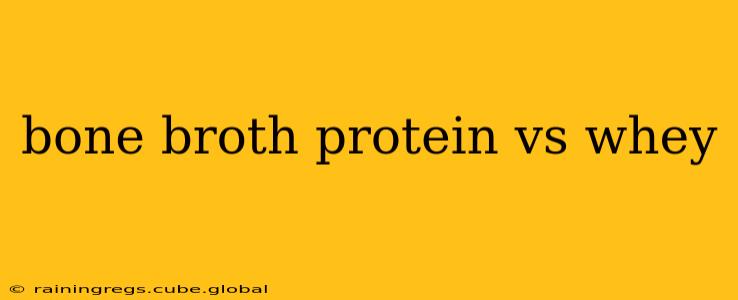Choosing the right protein powder can feel like navigating a minefield. With countless options flooding the market, understanding the nuances between different types is crucial. Today, we'll delve into a head-to-head comparison of two popular contenders: bone broth protein and whey protein. Both offer unique benefits, but which one emerges as the victor depends entirely on your individual needs and goals.
What is Bone Broth Protein?
Bone broth protein is derived from, as the name suggests, simmered bones and connective tissues of animals like cows, chickens, and fish. This slow-cooking process extracts collagen, gelatin, and other valuable nutrients. Unlike whey, which is a byproduct of cheese production, bone broth protein is a more holistic approach to protein supplementation, offering a broader spectrum of amino acids and other beneficial compounds.
Benefits of Bone Broth Protein:
- Rich in Collagen: Collagen is a crucial protein for skin, hair, nails, and joint health. Bone broth protein is a fantastic source, supporting elasticity and reducing wrinkles.
- Gut Health Support: The gelatin in bone broth protein can soothe the digestive tract, potentially easing symptoms of leaky gut and improving digestion.
- Joint Health: The amino acids glycine and proline, abundant in bone broth, play a vital role in cartilage formation and repair, making it beneficial for joint pain and mobility.
- Improved Sleep: Glycine also has a calming effect, potentially promoting better sleep quality.
What is Whey Protein?
Whey protein is a fast-digesting protein derived from milk, a byproduct of cheesemaking. It's a complete protein, meaning it contains all nine essential amino acids your body needs but cannot produce on its own. Whey protein is a popular choice among athletes and fitness enthusiasts due to its rapid absorption rate.
Benefits of Whey Protein:
- Fast Absorption: Whey protein is quickly digested and absorbed by the body, making it ideal for post-workout recovery, when muscle protein synthesis is maximized.
- Muscle Growth and Repair: Its high concentration of essential amino acids supports muscle growth and repair, contributing to increased strength and lean muscle mass.
- Versatile: Whey protein is available in various forms (concentrate, isolate, hydrolysate), offering different levels of protein content and digestibility.
- Widely Available and Affordable: Whey protein is readily available in most health food stores and online retailers, often at a more affordable price point than bone broth protein.
Bone Broth Protein vs. Whey Protein: Key Differences
| Feature | Bone Broth Protein | Whey Protein |
|---|---|---|
| Source | Animal bones and connective tissues | Milk (byproduct of cheesemaking) |
| Digestion | Slower digesting | Fast digesting |
| Amino Acid Profile | Broader range, including glycine and proline | Complete protein, high in branched-chain amino acids (BCAAs) |
| Primary Benefits | Joint health, gut health, skin health | Muscle growth, recovery, fast protein absorption |
| Cost | Generally more expensive | Generally less expensive |
Which Protein Powder is Right for You?
The "better" protein powder depends entirely on your individual needs and priorities.
- Choose bone broth protein if: You prioritize gut health, joint health, skin health, or are looking for a slower-digesting protein option.
- Choose whey protein if: You're focused on muscle growth, rapid post-workout recovery, and need a readily available and affordable option.
What are the Side Effects of Bone Broth Protein?
While generally safe, some individuals may experience mild side effects from bone broth protein, such as:
- Digestive upset: This is more likely if you consume large quantities or are sensitive to certain ingredients.
- Allergic reactions: Individuals with allergies to the animal source (e.g., beef, chicken) should exercise caution.
What are the Side Effects of Whey Protein?
Whey protein is generally well-tolerated, but some potential side effects include:
- Digestive issues: Bloating, gas, or diarrhea can occur, especially with higher intakes.
- Allergic reactions: Individuals with lactose intolerance or milk allergies should avoid whey protein.
Is Bone Broth Protein Better Than Whey for Weight Loss?
Both bone broth protein and whey protein can support weight loss when incorporated into a balanced diet and exercise regimen. Bone broth's high collagen content may help increase satiety, leading to reduced calorie intake, while whey protein's high protein content can boost metabolism and preserve lean muscle mass during weight loss. Neither is inherently "better" for weight loss.
Can Bone Broth Protein Be Used for Muscle Growth?
While bone broth protein doesn't offer the same rapid muscle-building effects as whey, its amino acid profile still supports muscle protein synthesis. It's not the primary choice for maximizing muscle growth, but it can contribute as part of a balanced protein intake.
This comparison provides a comprehensive overview of bone broth protein versus whey protein. Remember to consult with a healthcare professional or registered dietitian before making significant changes to your diet, especially if you have pre-existing health conditions.
